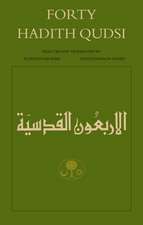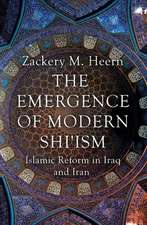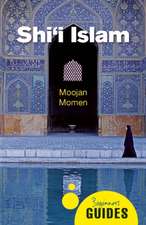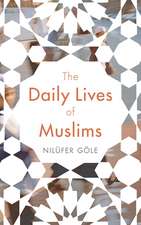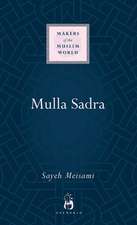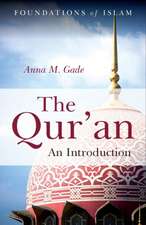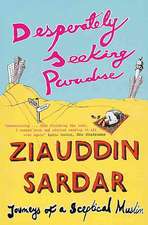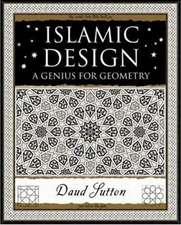Shah Abbas: The King who Refashioned Iran: Makers of the Muslim World
Autor Sholeh Quinnen Limba Engleză Hardback – 29 sep 2015
Shah Abbas (1597–1629) is the most well-known king of Iran’s Safavid dynasty (1501–1722), who ruled over Iran when the dynasty was at the height of its power and prestige. When Shah Abbas came to power his country was in chaos. Yet, within 11 years he had regained territory lost to his enemies, moved his capital city, and begun a transformation of Iranian society. In this wide-ranging profile, Sholeh Quinn explores his rise to power and subsequent interactions with religious movements and artistic developments, reaching beyond historical narrative to assess the true impact of the man and his politics. This thought-provoking and comprehensive account is ideal for readers interested in uncovering the life and thoughts of a man who ruled during a period described by many as a golden age for the arts in Iran.
Din seria Makers of the Muslim World
- 8%
 Preț: 189.64 lei
Preț: 189.64 lei - 8%
 Preț: 189.30 lei
Preț: 189.30 lei - 8%
 Preț: 189.30 lei
Preț: 189.30 lei - 8%
 Preț: 189.56 lei
Preț: 189.56 lei - 8%
 Preț: 225.41 lei
Preț: 225.41 lei - 8%
 Preț: 188.90 lei
Preț: 188.90 lei - 8%
 Preț: 189.05 lei
Preț: 189.05 lei - 8%
 Preț: 188.98 lei
Preț: 188.98 lei - 8%
 Preț: 188.71 lei
Preț: 188.71 lei - 8%
 Preț: 188.82 lei
Preț: 188.82 lei - 8%
 Preț: 188.82 lei
Preț: 188.82 lei - 8%
 Preț: 188.82 lei
Preț: 188.82 lei - 8%
 Preț: 187.98 lei
Preț: 187.98 lei - 8%
 Preț: 189.71 lei
Preț: 189.71 lei - 8%
 Preț: 187.55 lei
Preț: 187.55 lei - 8%
 Preț: 189.22 lei
Preț: 189.22 lei - 8%
 Preț: 188.82 lei
Preț: 188.82 lei - 8%
 Preț: 227.49 lei
Preț: 227.49 lei - 8%
 Preț: 188.06 lei
Preț: 188.06 lei - 8%
 Preț: 225.81 lei
Preț: 225.81 lei - 8%
 Preț: 188.39 lei
Preț: 188.39 lei - 8%
 Preț: 225.41 lei
Preț: 225.41 lei - 8%
 Preț: 225.41 lei
Preț: 225.41 lei - 9%
 Preț: 224.57 lei
Preț: 224.57 lei - 8%
 Preț: 189.22 lei
Preț: 189.22 lei - 8%
 Preț: 187.98 lei
Preț: 187.98 lei - 8%
 Preț: 189.59 lei
Preț: 189.59 lei - 8%
 Preț: 188.09 lei
Preț: 188.09 lei - 8%
 Preț: 188.39 lei
Preț: 188.39 lei - 8%
 Preț: 189.56 lei
Preț: 189.56 lei - 8%
 Preț: 188.06 lei
Preț: 188.06 lei - 8%
 Preț: 187.55 lei
Preț: 187.55 lei - 14%
 Preț: 177.17 lei
Preț: 177.17 lei - 8%
 Preț: 187.98 lei
Preț: 187.98 lei - 8%
 Preț: 188.98 lei
Preț: 188.98 lei - 8%
 Preț: 189.22 lei
Preț: 189.22 lei - 8%
 Preț: 189.48 lei
Preț: 189.48 lei - 8%
 Preț: 190.07 lei
Preț: 190.07 lei - 8%
 Preț: 190.47 lei
Preț: 190.47 lei -
 Preț: 282.43 lei
Preț: 282.43 lei - 8%
 Preț: 189.30 lei
Preț: 189.30 lei - 8%
 Preț: 187.98 lei
Preț: 187.98 lei -
 Preț: 98.82 lei
Preț: 98.82 lei
Preț: 225.41 lei
Preț vechi: 246.07 lei
-8% Nou
Puncte Express: 338
Preț estimativ în valută:
43.14€ • 46.84$ • 36.24£
43.14€ • 46.84$ • 36.24£
Carte disponibilă
Livrare economică 01-15 aprilie
Preluare comenzi: 021 569.72.76
Specificații
ISBN-13: 9781851684250
ISBN-10: 1851684255
Pagini: 160
Dimensiuni: 133 x 216 x 18 mm
Greutate: 0.32 kg
Editura: Oneworld Publications
Colecția Oneworld Publications
Seria Makers of the Muslim World
Locul publicării:United Kingdom
ISBN-10: 1851684255
Pagini: 160
Dimensiuni: 133 x 216 x 18 mm
Greutate: 0.32 kg
Editura: Oneworld Publications
Colecția Oneworld Publications
Seria Makers of the Muslim World
Locul publicării:United Kingdom
Notă biografică
Sholeh Quinn received her Ph.D. from the University of Chicago. She is currently an associate professor of history at the University of California, Merced, where she specializes in Safavid history.
Cuprins
Acknowledgements
Preface
Abbreviations
1 HISTORICAL BACKGROUND
The Safavids: the Sufi Order
From Sufi Order to Ruling Dynasty
After Isma'il
Qizilbash Culture and Society
Imposing Shi'ism
Early Notions of Legitimacy, Power, and Authority
Iran and the World: a Brief Overview
2 EARLY YEARS: 1571?1598
The Immediate Context: The Reigns of Shah Isma'il II and Muhammad Khudabanda
The Birth of Shah 'Abbas
First Attempts to Place 'Abbas Mirza on the Throne
'Abbas Mirza's Second Enthronement
Shah 'Abbas in Power
Shah 'Abbas and the Qizilbash
External Challenges: the Ottoman Truce
External Challenges: Relations with the Mughals
Gilan and Mazandaran
The New Ghulam Army
Shah 'Abbas and the Sufi Orders
Suppression of Religious Heresies: the Nuqtavis
Shah 'Abbas's Temporary Dethronement
Shah 'Abbas and Political Legitimacy
Shah 'Abbas as "The Supreme Lord of the Auspicious Conjunction"
3 BUILDING HALF THE WORLD: 1598?1612
The Image of the World Square
The King's Palace
The Royal Mosque
The Shaykh Lutf Allah Mosque
The Royal Bazaar
Endowments
Social Transformations: the Armenians and New Julfa
Social Transformations: the Safavid Household in Isfahan
General Economic Policies and Measures
Shah 'Abbas in Isfahan
4 RELIGION AND POWER IN ISFAHAN
The Pilgrimage on Foot to Mashhad
Shah 'Abbas and the 'Amili Clergy
Systematizing Orthodox Shi'ism: Shaykh Baha'i
The Friday Prayer Controversy
The School of Isfahan
Shah 'Abbas and Christianity
Religion and Kingship
5 FROM HALF THE WORLD TO THE OTHER HALF: WARFARE AND DIPLOMACY
Firearms
The Battle for Khurasan: Shah 'Abbas and the Uzbeks
Narrating the Campaign
The Battle against the Uzbeks
Shah 'Abbas's European Diplomacy
The Anti-Ottoman Alliance
Diverting the Flow of Silk
Travelers to the Shah
The Western Front: Shah 'Abbas and the Ottomans
6 THE ARTS IN THE SERVICE OF KINGSHIP
New Artistic Styles
A New Visual Identity
Calligraphers and Painters
Sadiqi Beg Afshar
'Ali Riza 'Abbasi
Mir 'Imad
Riza-yi 'Abbasi
The Arts in Diplomacy and Gift-Giving
The Embassy of Khan 'Alam
The Pierport Morgan Picture Bible
Internal Gift-Giving
7 THE FINAL PHASE: 1612?1629
Ashraf and Farahabad
Campaigns to Georgia
The Royal Export Silk Monopoly
Victory in Hormuz
The Taking of Qandahar
The Taking of Baghdad
Succession to the Throne
Shah 'Abbas's Death
Succession and Funeral
Conclusions
Further Reading
Bibliography
Index
Preface
Abbreviations
1 HISTORICAL BACKGROUND
The Safavids: the Sufi Order
From Sufi Order to Ruling Dynasty
After Isma'il
Qizilbash Culture and Society
Imposing Shi'ism
Early Notions of Legitimacy, Power, and Authority
Iran and the World: a Brief Overview
2 EARLY YEARS: 1571?1598
The Immediate Context: The Reigns of Shah Isma'il II and Muhammad Khudabanda
The Birth of Shah 'Abbas
First Attempts to Place 'Abbas Mirza on the Throne
'Abbas Mirza's Second Enthronement
Shah 'Abbas in Power
Shah 'Abbas and the Qizilbash
External Challenges: the Ottoman Truce
External Challenges: Relations with the Mughals
Gilan and Mazandaran
The New Ghulam Army
Shah 'Abbas and the Sufi Orders
Suppression of Religious Heresies: the Nuqtavis
Shah 'Abbas's Temporary Dethronement
Shah 'Abbas and Political Legitimacy
Shah 'Abbas as "The Supreme Lord of the Auspicious Conjunction"
3 BUILDING HALF THE WORLD: 1598?1612
The Image of the World Square
The King's Palace
The Royal Mosque
The Shaykh Lutf Allah Mosque
The Royal Bazaar
Endowments
Social Transformations: the Armenians and New Julfa
Social Transformations: the Safavid Household in Isfahan
General Economic Policies and Measures
Shah 'Abbas in Isfahan
4 RELIGION AND POWER IN ISFAHAN
The Pilgrimage on Foot to Mashhad
Shah 'Abbas and the 'Amili Clergy
Systematizing Orthodox Shi'ism: Shaykh Baha'i
The Friday Prayer Controversy
The School of Isfahan
Shah 'Abbas and Christianity
Religion and Kingship
5 FROM HALF THE WORLD TO THE OTHER HALF: WARFARE AND DIPLOMACY
Firearms
The Battle for Khurasan: Shah 'Abbas and the Uzbeks
Narrating the Campaign
The Battle against the Uzbeks
Shah 'Abbas's European Diplomacy
The Anti-Ottoman Alliance
Diverting the Flow of Silk
Travelers to the Shah
The Western Front: Shah 'Abbas and the Ottomans
6 THE ARTS IN THE SERVICE OF KINGSHIP
New Artistic Styles
A New Visual Identity
Calligraphers and Painters
Sadiqi Beg Afshar
'Ali Riza 'Abbasi
Mir 'Imad
Riza-yi 'Abbasi
The Arts in Diplomacy and Gift-Giving
The Embassy of Khan 'Alam
The Pierport Morgan Picture Bible
Internal Gift-Giving
7 THE FINAL PHASE: 1612?1629
Ashraf and Farahabad
Campaigns to Georgia
The Royal Export Silk Monopoly
Victory in Hormuz
The Taking of Qandahar
The Taking of Baghdad
Succession to the Throne
Shah 'Abbas's Death
Succession and Funeral
Conclusions
Further Reading
Bibliography
Index



